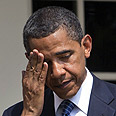
When the Obama administration banned the terms Islamic extremism and jihad from US national security documents back on April 7, 2010, the United States aired out a new approach to the war against terror. No longer would the ideological or religious elements that had driven the 9/11 attackers be emphasized. Any terms insinuating the religious zeal that inspires and has inspired suicide bombers from Gaza, Iran, Iraq, Afghanistan, Pakistan and elsewhere across the world have been hastily filed away in the cabinet known as the ill-conceived Bush Doctrine.
Instead, a new set of terms was formulated to showcase the White House’s new and improved outreach to the Muslim world. On the same day that Associated Press carried the "banned terms" news release, the assistant to President Obama on Homeland Security and Counterterrorism, John Brennan spoke with law students at New York University, where he referred to Jerusalem by its Arabic name, al-Quds.
A month later on May 28, President Obama informed the world that the “war on terror” was over. “Our long-term security will not come from our ability to instill fear in other peoples but through our capacity to speak to their hopes,” the US president said.Terms like new partnerships, multilateral diplomacy, and tough engagement surfaced in the document, all leading to Obama’s point that “to succeed, we must face the world as it is.”
It would be safe to surmise that in Barack Obama’s world, there are no ideological-driven terrorists (only al-Qaeda), jihad against non-Muslims does not exist, and Jerusalem is a city exclusively rooted in an Islamic past, whose Jewish heritage starting from King David in 1000 BCE, bears no relevance at all to the Middle East today.
But for the residents in the southern region of Israel, the president’s attempt to recreate a new Middle East through glossed-up verbiage remains a very distant fantasy.
Obama convinces no one
For the 111,000 residents of Ashkelon, located 21 kilometers (13 miles) away from the Gaza Strip, this past Friday, July 30 was a terrifying day. An Iranian Grad missile launched from Gaza exploded in the heart of a residential neighborhood, damaging buildings and vehicles and sending two civilian Israelis hospitalized for shock. A rocket alert that had residents racing to shelters prevented more serious casualties.
The following Saturday night, July 31, an upgraded Qassam rocket fired at Sderot directly struck a children’s hydrotherapy rehabilitation center in Sapir College, setting off the Color Red alarm. The center, which provides therapy and workshops for hundreds of special-needs kids from across Israel until 10 at night on weekdays, was closed because of the Jewish Sabbath.
A friend of mine living in Sderot and recently married, now pregnant, spoke to me after the rocket attack, telling me how the rocket alarm caught her completely off guard. She wonders how she will raise a child in an environment of bomb shelters and rocket sirens. “These rocket launchers fire these rockets and hope to indiscriminately target anything,” she told me.
But if President Obama says that the war on terror is over, then it must also be over for Israel as well. In a Middle East without jihad and Islamic extremism, Jews and Christians are all on equal footing and Israel’s borders are magically secure. What exactly unifies Iran, Syria, Libya and Lebanon? Along the Obama narrative, it must be their love for Israel and a Mideast education system that recognizes Israel as a legitimate Jewish state.
The truth is that as long as Israel “occupies” Al Quds (Jerusalem), Al Majdal (Ashkelon), Al Najd (Sderot), Al Khalil (Hebron), Tel Ar Rabee (Tel Aviv), as shown on tourist maps from the Palestinian Authority’s Ministry of Tourism and Antiquities, extremist elements will continue to fuel the Arab-Israeli conflict. A Jewish state in the Levant is no more tolerated today in the Arab world even under Obama’s policy shift, than it was in 1948.
As Iranian President Ahmadinejad made very clear this past February when meeting with Syrian President Bashar Assad, “the Arab world will usher in a new Mideast without Zionists.”
But has the Obama administration’s friendly policies changed its image among Muslims in the Middle East, as the US president has tried so hard to do?
According to an international survey conducted by the Pew Global Attitudes Project, released in June, Muslim nations’ approval of President Obama has dropped, although numbers in some countries like Pakistan were quite low to begin with. What the survey did show is that there was a slight rise in the number of Muslims who said that suicide bombings and other forms of violence against civilians were justified to protect Islam from its enemies.
At the end of the day, President Obama’s attempts to create a new Middle East through mere rhetoric, downplaying radical Islamist ideology in a war against terror that does not exist, seems to have convinced no one beyond the Oval Office and US State Department.
Anav Silverman, a native of Maine, writes from Jerusalem, Israel where she is an instructor at Hebrew University's Secondary School of Education. She also works as an international correspondent at Sderot Media Center















